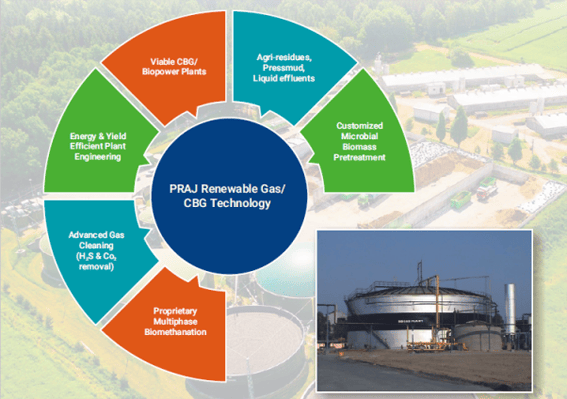India announced mandatory blending of Compressed Bio-Gas (CBG) in CNG (Transport) & PNG (Domestic)
The Indian government has announced that blending compressed bio-gas (CBG) with compressed natural gas (CNG) and piped natural gas (PNG) will be mandatory starting in 2025-26. The blending will be voluntary until 2024-2025.
Ministry of Petroleum & Natural Gas introduced phase-wise CBG Blending Obligation (CBO) to promote production and consumption of CBG.
CBO is an obligation where mixtures of traditional and alternative fuels (like CBG) are blended in varying percentages in order to displace petroleum.
- It will encourage investment (around Rs. 37500 crores) and facilitate establishment of 750 CBG projects by 2028-29.
Key objectives of CBG Blending Obligation (CBO)
- Stimulate demand for CBG in CGD sector,
- Import substitution for Liquefied Natural Gas, Saving in foreign exchange, Promoting circular economy and,
- Assisting in achieving net zero emissions.
CBG Blending Obligation (CBO) Roadmap
- CBO will be voluntary till FY 2024-2025 and mandatory blending obligation would start from FY 2025-26.
- CBO shall be kept as 1%, 3% and 4% of total CNG/PNG consumption for FY 2025-26, 2026- 27 and 2027-28 respectively. From 2028-29 onwards CBO will be 5%.
- Central Repository Body shall monitor and implement blending mandate.
What is Compressed Bio Gas (CBG)?
CBG is an energy-rich gas produced by anaerobic decomposition of biomass like agriculture residue, cattle dung, sugarcane press mud, municipal solid waste, among other.
- It comprises: Methane (it consists 90%), carbon dioxide and low levels of Hydrogen sulphide and ammonia.
Initiatives taken to promote biofuels
- National Biofuels Coordination Committee set up 1% and 2% Sustainable Aviation Fuel (SAF) initial indicative blending percentage targets for International flights in 2027 and 2028 respectively.
- SATAT (Sustainable Alternative Towards Affordable Transportation) scheme.
- Galvanizing Organic Bio-Agro Resources Dhan (GOBAR-DHAN) scheme
Can we use CBG in CNG cars?
Yes, CBG can be used in CNG cars without any modifications. CBG has similar properties to CNG and can be stored in the same cylinders. CBG can also be transported through pipelines or cylinders to retail outlets.
Can biogas be used directly in natural gas engines?
Biogas can be used directly in gas engines to produce electricity and heat. Biogas can also be used in compression ignition (CI) engines because it mixes well with air and burns cleanly.
Can biogas be used in a diesel engine?
Yes, biogas can be used in diesel engines. Biogas can be used in both compression ignition (diesel) and spark ignition engines (petrol).
Biogas is environmentally beneficial in diesel engines because:
- It increases renewable fuel consumption in transport
- Methane has less carbon than diesel fuel
- It can reduce pollutant levels in exhaust
Is biogas cheaper than diesel?
Biogas is cheaper than traditional fuels. It can save more than 40% on fuel costs compared to petrol. In India, Bio CNG costs ₹ 46 per kg, while CNG costs ₹ 69.11 per kg at the minimum.
The cost of producing biogas varies from USD 2/MBtu to USD 20/MBtu. The average cost in Europe is around 16/MBtu, while in Southeast Asia it is USD 9/MBtu.

